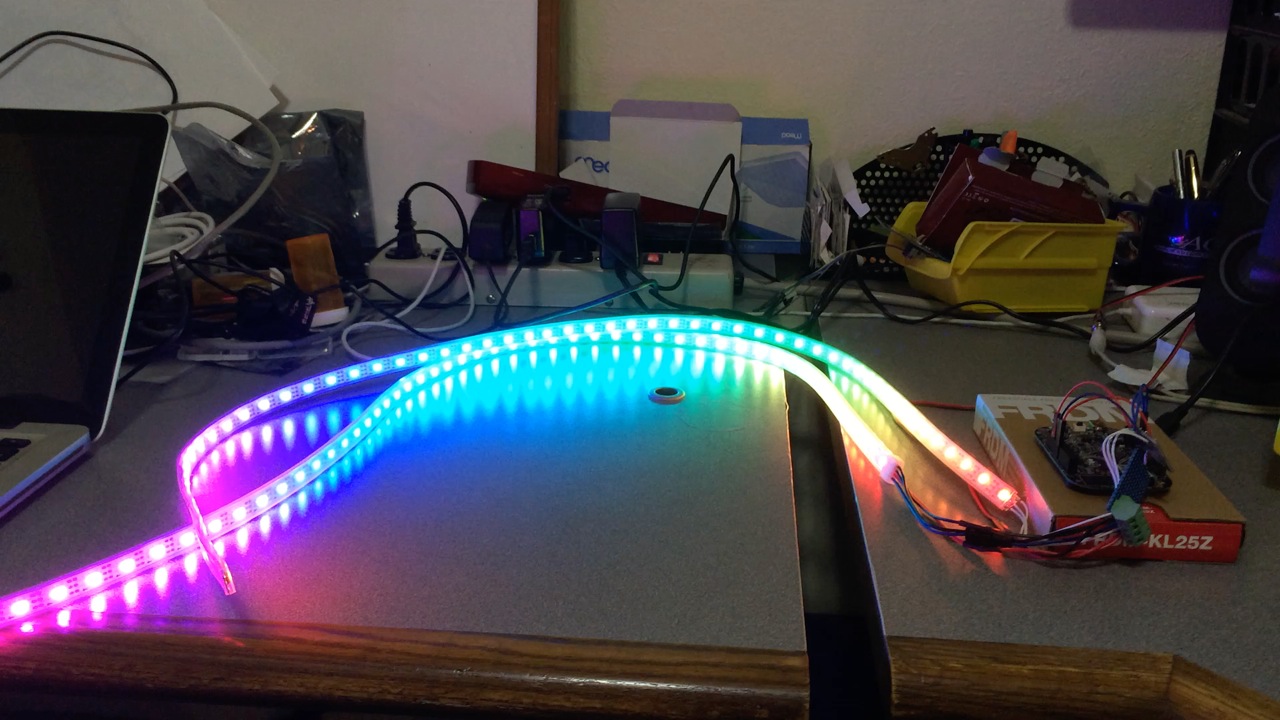Test program for my Multi_WS2811 library that started out as a fork of heroic/WS2811. My library uses hardware DMA on the FRDM-KL25Z to drive up to 16 strings of WS2811 or WS2812 LEDs in parallel.
Dependencies: Multi_WS2811 mbed MMA8451Q
Fork of WS2811 by
NOTE: I have accidentally pushed changes for another fork of this program that I used in the recent Georgetown Carnival Power Tool Races. When I get some time, I will restore the test program to its original glory.
You can see my power tool racer (Nevermore's Revenge) here

This tests my FRDM-KL25Z multi-string WS2811/WS2812 library. It uses the accelerometer to change the rainbow phase on two strings of LEDs as well as the touch sense to change brightness.
A video of this program in operation is here.
Here is the library that I developed to run the LEDs:
Import libraryMulti_WS2811
Library allowing up to 16 strings of 60 WS2811 or WS2812 LEDs to be driven from a single FRDM-KL25Z board. Uses hardware DMA to do a full 800 KHz rate without much CPU burden.
Revision 0:12e734116fea, committed 2011-12-16
- Comitter:
- ehbmbed2
- Date:
- Fri Dec 16 03:16:50 2011 +0000
- Child:
- 1:6ebd3ac910b6
- Commit message:
- first revision, works, needs to be tested on long strands
Changed in this revision
| LPD8806.cpp | Show annotated file Show diff for this revision Revisions of this file |
| LPD8806.h | Show annotated file Show diff for this revision Revisions of this file |
--- /dev/null Thu Jan 01 00:00:00 1970 +0000
+++ b/LPD8806.cpp Fri Dec 16 03:16:50 2011 +0000
@@ -0,0 +1,85 @@
+// Mbed library to control LPD8806-based RGB LED Strips
+// (c) 2011 Jelmer Tiete
+// This library is ported from the Arduino implementation of Adafruit Industries
+// found at: http://github.com/adafruit/LPD8806
+// and their strips: http://www.adafruit.com/products/306
+// Released under the MIT License: http://mbed.org/license/mit
+
+/*****************************************************************************/
+
+#include "LPD8806.h"
+
+//Define SPI pins
+SPI spi(p5, p6, p7); // mosi, miso, sclk
+//SPI spi(p11, p12, p13); // mosi, miso, sclk
+
+LPD8806::LPD8806(uint16_t n) {
+ // Allocate 3 bytes per pixel:
+ if (NULL != (pixels = (uint8_t *)malloc(numLEDs * 3))) {
+ memset(pixels, 0x80, numLEDs * 3); // Init to RGB 'off' state
+ numLEDs = n;
+ }
+}
+
+void LPD8806::begin(void) {
+
+ // Setup the spi for 8 bit data, low steady state clock,
+ // first edge capture, with a 2MHz clock rate
+ spi.format(8,0);
+ spi.frequency(2000000);
+
+ // Issue initial latch to 'wake up' strip (latch length varies w/numLEDs)
+ writezeros(3 * ((numLEDs + 63) / 64));
+}
+
+uint16_t LPD8806::numPixels(void) {
+ return numLEDs;
+}
+
+void LPD8806::writezeros(uint16_t n) {
+ while (n--) spi.write(0x00);
+}
+
+// This is how data is pushed to the strip. Unfortunately, the company
+// that makes the chip didnt release the protocol document or you need
+// to sign an NDA or something stupid like that, but we reverse engineered
+// this from a strip controller and it seems to work very nicely!
+void LPD8806::show(void) {
+ uint16_t i, nl3 = numLEDs * 3; // 3 bytes per LED
+
+ for (i=0; i<nl3; i++ ) {
+ spi.write(pixels[i]);
+ }
+
+ // Write latch at end of data; latch length varies with number of LEDs
+ writezeros(3 * ((numLEDs + 63) / 64));
+
+ // We need to have a delay here, a few ms seems to do the job
+ // shorter may be OK as well - need to experiment :(
+// wait_ms(3);
+}
+
+// Convert R,G,B to combined 32-bit color
+uint32_t LPD8806::Color(uint8_t r, uint8_t g, uint8_t b) {
+ // Take the lowest 7 bits of each value and append them end to end
+ // We have the top bit set high (its a 'parity-like' bit in the protocol
+ // and must be set!)
+ return 0x808080 | ((uint32_t)g << 16) | ((uint32_t)r << 8) | (uint32_t)b;
+}
+
+// store the rgb component in our array
+void LPD8806::setPixelColor(uint16_t n, uint8_t r, uint8_t g, uint8_t b) {
+ if (n >= numLEDs) return; // '>=' because arrays are 0-indexed
+
+ pixels[n*3 ] = g | 0x80;
+ pixels[n*3+1] = r | 0x80;
+ pixels[n*3+2] = b | 0x80;
+}
+
+void LPD8806::setPixelColor(uint16_t n, uint32_t c) {
+ if (n >= numLEDs) return; // '>=' because arrays are 0-indexed
+
+ pixels[n*3 ] = (c >> 16) | 0x80;
+ pixels[n*3+1] = (c >> 8) | 0x80;
+ pixels[n*3+2] = c | 0x80;
+}
--- /dev/null Thu Jan 01 00:00:00 1970 +0000
+++ b/LPD8806.h Fri Dec 16 03:16:50 2011 +0000
@@ -0,0 +1,39 @@
+// Mbed library to control LPD8806-based RGB LED Strips
+// (c) 2011 Jelmer Tiete
+// This library is ported from the Arduino implementation of Adafruit Industries
+// found at: http://github.com/adafruit/LPD8806
+// and their strips: http://www.adafruit.com/products/306
+// Released under the MIT License: http://mbed.org/license/mit
+
+/*****************************************************************************/
+
+#include "mbed.h"
+#ifndef MBED_LPD8806_H
+#define MBED_LPD8806_H
+
+class LPD8806 {
+
+ public:
+
+ LPD8806(uint16_t n);
+ void
+ begin(void),
+ show(void),
+ setPixelColor(uint16_t n, uint8_t r, uint8_t g, uint8_t b),
+ setPixelColor(uint16_t n, uint32_t c);
+ uint16_t
+ numPixels(void);
+ uint32_t
+ Color(uint8_t, uint8_t, uint8_t);
+
+ private:
+
+ uint8_t
+ *pixels; // Holds LED color values
+ uint16_t
+ numLEDs; // Number of RGB LEDs in strand
+
+ void
+ writezeros(uint16_t n);
+};
+#endif
\ No newline at end of file
 Ned Konz
Ned Konz


 Generic WS2811/WS2812
Generic WS2811/WS2812